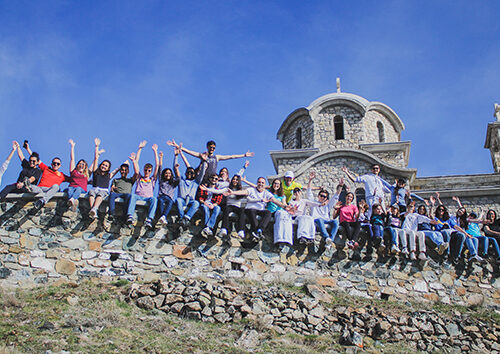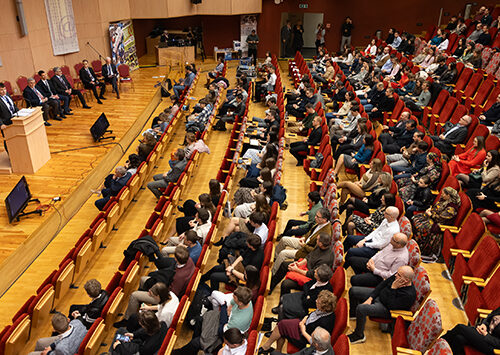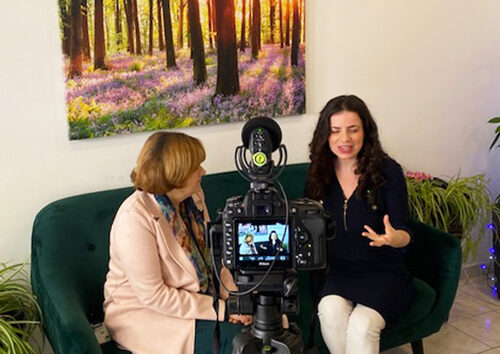19 October 2016 | Binfield, England [Helen Pearson]
Newbold College’s 2016 Beach lecturer, Dr. Philip Lewis, visiting fellow at York St John University, was admirably qualified to speak about Christian-Muslim relations in Britain. He has lived alongside Muslims both in the UK and in Pakistan while for more than three decades, studying, writing and lecturing about Islam. His lifework has been advising churches and secular organisations and encouraging Muslim-Christian understanding.
He began by dividing 20th century UK Muslims into those who visited post-war, those who followed them here believing that they would eventually return to their Muslim homelands, and those who finally settled here. He showed that Muslim groups in various parts of the UK have different national backgrounds – some from East Africa, some from Pakistan, some from Turkey. Within each group there is further division between older and younger generations, English and non-English speakers, and a widening gap between those from an industrial culture and the more educated YUMMIs – young, upwardly mobile Muslims. “No-one is a ‘Muslim in general,’” he said.
He identified negative and positive changes to Muslim societies since the atrocities of 9/11 and 7/7. The ensuing moral panic in the media which has targeted Muslims as ‘the enemy within’ has been socially destructive. On the other hand, he pointed out that government funding has become available to address deficits in Muslim leadership, including that of imams, over 90% of whom have been born outside the UK.
Muslim scholars themselves have three broad responses to the wider society: isolation, engagement and resistance. Dr. Lewis believes that there is and needs to be radical re-thinking within Islam if all Muslim leaders are to be in touch both with their own communities and the wider society. As it is, he suggested, sexuality and political subjects are often taboo in both mosques and homes, leaving young Muslims adrift.
The specific intellectual challenges facing UK Muslim communities were Dr Lewis’ next focus. Muslim theology, he showed, offers no systematic formulation of being in the minority. Historically, Muslim thought was often developed in a military context which took success and dominance for granted. Muslims knew how to command and obey but had little experience of living with equality or, like many Jewish and Christian communities, as minorities. Progressive Muslim scholars are now seeking to quarry their traditions for resources which will enable them to share power in democracies.
They are hampered in this work by the persistence of imported sectarianism, by cultural illiteracy, the lack of Muslim arts graduates, and the lack of a Muslim tradition of curiosity about ‘otherness’. Some in the Muslim world are beginning to realise that their co-religionists have not understood or participated in the construction of modernity for over four centuries.
But there are optimistic signs: a greater engagement in tertiary education both by and with Muslims, educated Muslim women working for a visible, active progressive Islam, and the development of a British Muslim intellectual tradition in the UK with a few public intellectuals like Hakim Murad and Mona Siddiqui. Politically too, Muslims like Baroness Warsi and the Mayor of London, Sadiq Khan, are becoming more visible. And then there are the celebrity Muslims, Nadiya Hussain, Mo Farah and Citizen Khan!

‘If Christian Muslim relations are to succeed we need a safe space to ask hard questions of each other,’ Dr. Lewis concluded. For the 100-strong audience in Newbold’s Salisbury Hall, this year’s Beach Lecture provided one such space. [tedNEWS]
https://www.youtube.com/watch?v=PrPV-Rxj1ts&feature=youtu.be
tedNEWS Staff: Victor Hulbert, director; Esti Pujic, editor
119 St Peter’s Street, St Albans, Herts, AL1 3EY, England
E-mail: [email protected]
Website: www.ted.adventist.org
tedNEWS is an information bulletin issued by the communication department of the Seventh-day Adventist Church in the Trans-European Division.
You are free to re-print any portion of the bulletin without need for special permission. However, we kindly request that you identify tedNEWS whenever you publish these materials.



